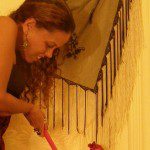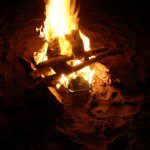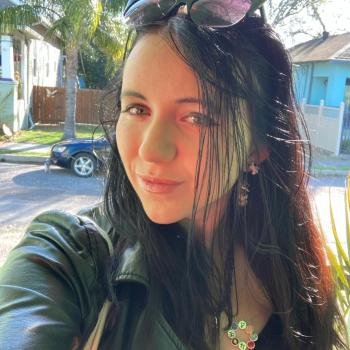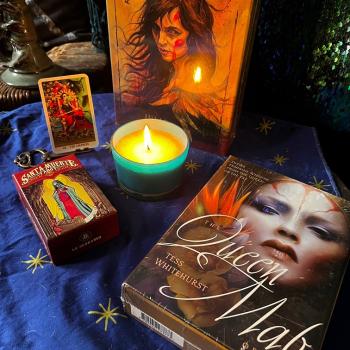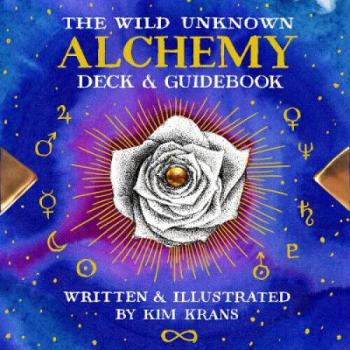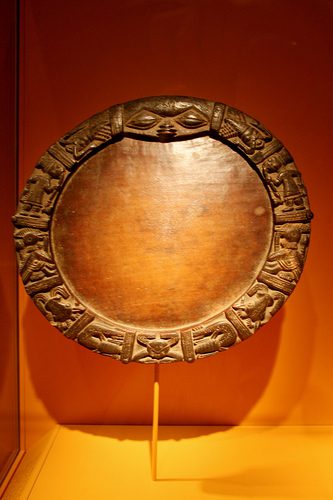
Just in time for October 4th, the traditional feast day for Orunmila or Orula,the Orisha of divination, the latest installment of our divination series. We are honored to present an interview with Awo Robert Ogbe Di.
When did you start divining? With what method?
Wow, it’s been a while! I got a tarot deck as a gift when I was a kid, maybe 14, and I played around with it until I figured out how to read with it, though it took a long time to put down the book because I was always worried I would “do it wrong”. I know better now. After that, I did a little work with a lot of different systems.
What method do you use most often now?
As a babalawo, I divine with the tools of my religion. Mostly with the divining chain (ekuele), but also with coconut (obi) and at major ceremonies with the sacred palm nuts (ikin). Once I passed to Ifa, I stopped using other methods of divination. When you are a priest of the Orisha of Divination, you have sort of an embarrassment of riches when it comes to divination methods… there really isn’t any need to go outside for anything.
How important is the question?
In my opinion, the question is 50% of what determines the quality of any divination, either for yourself or for someone else. The other 50% is split between intention (25%) and skill of the diviner (25%). I will address each of these briefly.
The question is key because it’s what is being asked. This sounds obvious, even redundant, but it is by far the number one problem that people have when they are trying to either read for themselves or get a reading with someone else. So often I see clients who are either embarrassed to ask something, or who are just unclear in their thinking. Just like with computing, garbage in, garbage out – you have to ask a clear question to get a clear answer. Another issue that comes up a lot is asking the wrong question. For example, someone comes asking “will I be able to buy a car?” Well, hold on, why do you need a car? What is the purpose? To get to work, to get your groceries, to drive your mom to the doctor, to make a road trip? Many people show up with a predefined narrative already set in their minds of how things are “supposed” to play out… these people will never be happy no matter what they are told, because they are not open to any alternative ideas of how things could manifest. That openness to change and willingness to be creative in solutions is the key, not only to divination, but to any form of contentment in life.
Intention is next in importance, because even the most perfectly phrased question cannot produce a clear answer if it is not the question the person’s heart is asking. If someone comes and asks “will I get the job at XYZ Corp?” when all their mind’s attention and energy is focused completely on the man or woman they met the night before, or their sick family member, or even what they are going to fix for dinner, their reading will be either muddy or completely misleading. Ideally, the person will be totally focused and present in the moment of divination; this gives the most clarity. This is why many professional diviners will keep you sitting for a bit when you arrive, rather than jumping into the divination – they want to give you a chance to catch up with yourself and focus on where you are, instead of taking all the stress of travel and the day into the reading with you.
I have to put the skill of the diviner in the list because divination is one of the “knack” skills, like creative writing, painting, music, sports, and so forth. Some people are naturally more skilled than others. Very few people can’t make anything work; very few people have the natural ability to pick up a divination tool and just start giving good readings right off the bat. Divination is a skill like anything else, and as time goes by, the diviner will learn more and more about the tools that s/he is using. Practice is key. Even the most naturally skilled person is only able to divine reliably if they have been practicing and using their tools for long enough to learn them. If someone is choosing a diviner to visit, find someone who has been working with their tools for at least a few years, and someone who has a good reputation for producing consistent results. It’s easy to find someone to tell you what you want to hear, but it’s a little more challenging to find someone who tells you what will really happen.
Do you have a yes/no method of divining you recommend?
For most people, pendulum dowsing is the easiest and most reliable method. This type of yes/no work is pretty fundamental and there aren’t many people who can’t make it work with a little bit of practice.
Is there any advice you have for newcomers when using divination?
*laughing* Quite a bit… how much space do I have?
Seriously, though, the main advice is practice. Do it over and over until you are completely familiar with the process; it is almost impossible for the intuition to provide any insight when you are still completely focused on trying to remember what step or steps need to be done next. Once you have the process down, then you will start noticing that stray intuitions start popping in. At first, this can be pretty random, and it helps to have other people to work with who will give you reliable feedback. “Yes, that is relevant” and “no that is not relevant” are a lot more valuable in the long run than the person who says “Wowwww, so truuuuuuee….” every time you open your mouth.
Secondly, as the Romans would say “festina lente”, or ‘hurry, slowly’. Don’t leap into divination to get immediate answers for your life’s major problems. Anything that you are deeply emotionally invested in should probably be investigated by a neutral third party. Daily readings for yourself will teach you what the indications mean (cards, astrological configurations, etc.) much more than sitting down once a month. Make the divination system a part of your life; identify life events and things you see in daily life as representations of the energies of the cards/stars/runes/whatever you use. For example, if you see an older woman looking sour and pensive, think “ah, Queen of Swords”; if a friend describes a love triangle, try to imagine how that situation would be described by the cards in a reading. This type of engagement with the images and symbols will dramatically speed up your learning process and encourage your intuition to chime in more quickly and reliably. It is also usual that your readings for other people will be more accurate sooner than the readings for yourself, so if you find that your readings for others are spot on but your readings for yourself aren’t quite there yet, don’t give up! Keep at it, and slowly you will come to realize that your readings are becoming startlingly accurate.


